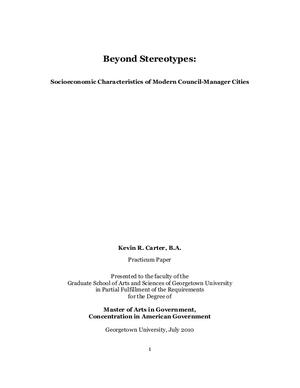
The majority of literature on the council-manager form of government focuses on its performance versus the mayor-council form of government. This vein of research likely results from reformers’ claims that the council-manager form of government is the superior form. Research on the topic therefore attempts to empirically test performance of one form versus the other using different assigned variables (e.g. efficiency, level of taxes, quality of life, etc.). These tests ask the question, “Is council-manager form of government better?” Noticeably absent in the literature, however, is the question “Why does a city have council-manager form of government?” If one can assume from the first question that one form of government performs better than the other, it naturally follows to ask why that form is not universally adopted. Or better yet: if the normative question proves inconclusive, why do certain cities adopt one form and other cities another? And, what are the common characteristics or differences between those cities? This paper examines the prevailing stereotypes surrounding the council-manager form of government, provides a literature review on the political development of those stereotypes, and then tests socioeconomic differences between the two forms of government through regression analysis. The results find that council-manager cities are not dissimilar from the stereotypes commonly found 40 years ago: Council-manager cities remain young, mobile, and middle-class, but – given changing immigration and demographics especially in the Southwest – they are significantly more diverse than ever before.
